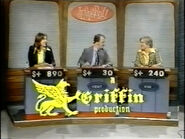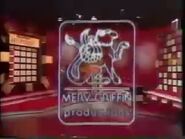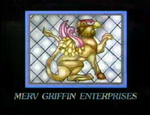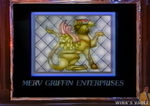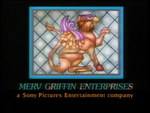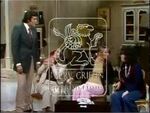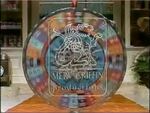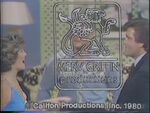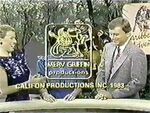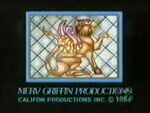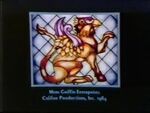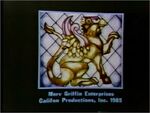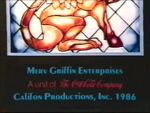Merv Griffin Enterprises was a production company founded in 1964 by none other than television personality/entrepreneur Merv Griffin. When it started out, it was simply called Merv Griffin Productions.
The 1980s and 1990s
In 1980, Griffin and Metromedia picked up syndie rights of Wheel of Fortune from NBC as well as the revival of the Jeopardy! television series.
The syndication rights to Wheel of Fortune, Jeopardy!, and The Merv Griffin Show were given to King World (now CBS Television Distribution) in 1982 to syndicate a nightly version of Wheel of Fortune. Until 1986, King World company also had the rights to syndicate The Merv Griffin Show, when the syndication rights were moved to Columbia Pictures Television for the final episodes and the first two pilots of Jeopardy! in 1983 and January 9, 1984. In 1984, Griffin expanded his company as Merv Griffin Enterprises. That same year, Jeopardy! also returned to television, but was syndicated nightly as well on September 10, 1984. On May 5, 1986, Griffin sold the company to The Coca-Cola Company (then-owner of Columbia Pictures Industries) for $250 million during his retirement. Griffin, however, still held the copyrights of the game shows. The company later became part of Coca-Cola Television on November 24, 1986, merged into Columbia Pictures Entertainment on December 21, 1987, and was sold to Sony Corporation along with CPE's other companies on November 8, 1989.
Merv Griffin Enterprises was folded into Columbia TriStar Television (now Sony Pictures Television) on July 22, 1994; Jeopardy! and Wheel of Fortune were taken over by Columbia TriStar Television, while Griffin remained executive producer for both game shows until 2000. Griffin later founded independent production company Merv Griffin Entertainment, a division of The Griffin Group on May 13, 1996.
Shows Created/Produced
- Word for Word (1963–1964, as "Milbarn Productions"; based on an unsold Bill Derman pilot called Shopping Spree)
- Jeopardy! (1964–1975, 1978–1979, 1984–Present; originally pitched as What's the Question?; production responsibilities assumed in 1994 by Columbia TriStar Television and later Sony Pictures Television; distributed in syndication since September 10, 1984 by King World, now CBS Television Distribution))
- Let's Play Post Office (1965–1966)
- Reach for the Stars (1967)
- One in a Million (1967)
- Joe Garagiola's Memory Game (1971)
- Shopper's Bazaar (1973 unsold pilot; original prototype of Wheel of Fortune)
- Wheel of Fortune (1975–present; production responsibilities assumed in 1994 by Columbia TriStar Television and later Sony Pictures Television; nighttime version distributed since September 19, 1983 by King World, now CBS Television Distribution))
- Dance Fever (1979-1987; co-produced and distributed by 20th Century Fox Television))
- Headline Chasers (1985–1986; co-produced with Wink Martindale Enterprises and Distributed by King World)
- Buzzword (1986 unsold pilot)
- Strike a Match (1987 unsold pilot)
- Winfall (1988 unsold pilot)
- Super Jeopardy! (1990; co-produced by King World)
- Monopoly (1990; co-produced by King World)
- Ruckus (1991)
Shows Based on Griffin's Formats
- Wheel 2000 (1997–1998; also called Wheel of Fortune 2000)
- Jep! (1998–2000)
- Rock & Roll Jeopardy! (1998–2001)
- Sports Jeopardy! (2014–2016)
- Jeopardy!: The Greatest of All Time (2020; also called G.O.A.T)
- Celebrity Wheel of Fortune (2021-)
- Jeopardy! National College Championship (2022)
- Celebrity Jeopardy! (2022-)
- Jeopardy! Masters (2023-)
Copyright Holders
- Califon Productions, Inc. is the copyright holder for Wheel of Fortune.
- Califon Enterprises, Inc., a subsidiary of Califon Productions, Inc., produced the 1978-1979 revival of Jeopardy!, known as The All-New Jeopardy!.
- Anthony Productions, Inc. is the copyright holder for The Merv Griffin Show and Dance Fever.
- Jeopardy Productions, Inc. is the copyright holder for the current revival of Jeopardy! and the ABC edition of Super Jeopardy!.
- Line Chasers, Inc. is the copyright holder for Headline Chasers.
- Fortune Productions is the copyright holder for Monopoly.
The Logo
The Merv Griffin logo was simply a griffin. A griffin is a Greek mythical creature with the body of a lion and the wings and head of an eagle. The 1993-1994 version is interesting, since it features the griffin with the Columbia Pictures clouds behind it.
Wheel of Fortune
From February 1984 to 1991 instead of the computer animated logo, Wheel of Fortune used a standard production card. Even the font was different, as it changed to Peignot. It started out black just like the computer animated logo, but in 1987 the background changed to yellow.
